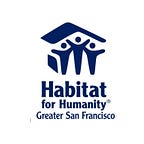Pivotal time for housing bills in Sacramento as 2020–2021 legislative session continues
The start of summer is always a busy time in the state legislative calendar, and this year is no different. Here, Habitat Greater San Francisco takes a look at the major housing bills still alive in Sacramento and their potential to promote affordable homebuilding and affordable homeownership in California.
SB10. Authored by San Francisco Sen. Scott Wiener, this bill would allow cities and counties to pass ordinances to zone any parcel of land for up to 10 residential units if the parcel is close to transit or jobs, or is an urban infill project. In practice these locally-passed ordinances would override other restrictions or limitations that might exist, making them the last word on whether homes can be built.
Smaller projects, of fewer than 10 homes, have enormous potential to address our housing crisis. This bill’s combination of removing some of the most serious impediments to getting them built, while making sure local officials remain in control and are fully accountable, has attracted significant support.
Having already cleared the Senate (27–7), the bill passed the Assembly Housing and Community Development Committee on June 30 (6–1) and is now subject to further negotiation and consideration in the Assembly.
The bill analysis is here. You can also read an op-ed by Habitat Greater San Francisco CEO Maureen Sedonaen for CalMatters (also available in Spanish).
AB1401. This bill, introduced by Burbank Assemblymember Laura Friedman, would prohibit the enforcement of any minimum automobile parking requirements for new building developments if they are located near public transit.
In many instances, minimum parking requirements contribute to housing shortages because it raises the cost of housing production. Supporters expect that the bill would promote more homes being built.
This bill passed the Assembly on June 1 (51–17). It is currently being considered by the Senate where it was referred to the Appropriations Committee on July 8.
AB602. This proposed legislation, introduced by Concord and Vallejo Assemblymember Tim Grayson, aims to shine a spotlight on the impact of new housing “impact fees”. These are fees charged by local authorities ostensibly to cover the impact the developments might have on the community in which they are built. California impact fees, though, are the highest in the nation and can easily add tens of thousands of dollars per home to the cost of building.
The bill would require local authorities, when they propose the levying of new or increased impact fees on housing, to specifically identify both existing service levels and proposed new service levels and explain why the new service level is appropriate. They would then have to provide supporting information that they are using to justify the imposition of a new fee, or raising of an existing fee.
This would go some way towards highlighting the issue and could be a platform for further legislation in the years ahead.
The bill passed the Assembly on May 27 (76–0). It was passed unanimously by the Senate Committee on Housing on July 8 and has been referred to the Senate Appropriations Committee for further consideration.
AB1095. This Habitat-sponsored bill, introduced by Asm. Ken Cooley, would clarify existing law to make it explicit that funding from the Affordable Housing and Sustainable Communities Program (AHSC) can be used for owner-occupied homes.
The AHSC funds land use, housing, transportation, and land preservation projects to support infill and compact developments that reduce greenhouse has emissions. It is an important source of funding for housing projects.
One of the primary barriers to increasing the supply of affordable homes for homeownership is the lack of available public funding sources. This is because many state funding sources — including AHSC — have criteria that ostensibly favor rental projects over homeownership developments even if a particular project would be otherwise identical. This bill makes it clear that homeownership projects are permitted.
The bill passed the Assembly on May 20. It is currently in the Senate where it was passed by the Housing committee (8–0) on June 17. It has now been referred to the Appropriations committee where it has been referred to the suspense file. More information will be forthcoming in the weeks ahead.
SB728. This Habitat-sponsored bill, introduced by Sen. Robert Hertzberg, would authorize qualified nonprofit housing organizations to purchase a for-sale unit under state density bonus laws. This would address an issue whereby developers interested in using density bonus laws to build affordable owner-occupied homes, are not currently permitted to sell these homes to Habitat (who would then take possession, apply an affordability covenant, and sell to a qualified family). Instead, the developer must expend considerable resources to do this themselves. This has prevented Habitat affiliates from working with developers on certain affordable projects.
The bill passed the Senate (39–0) on June 1. It passed the Assembly Committee on Local Government (8–0) on July 1 and has now been referred to the Assembly Committee on Appropriations.
AB753. This bill would commission a study on using funds from the state Storage Tank Cleanup Trust Fund to clean-up contaminated sites that could then be used for affordable housing.
The bill passed the Assembly on June 1 (61–15). It passed the Senate Environmental Quality Committee on June 28 and was subsequently sent to the Senate Appropriations Committee where it has been referred to the suspense file. The prognosis for this bill will become clearer in the weeks ahead.
To keep up to date on the progress of these bills, please follow @HabitatGSF on Twitter.
